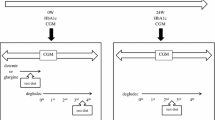Abstract
Background
Insulin degludec/insulin aspart (IDegAsp) is the first dual combination that acts separately (basal and prandial actions). Different insulin regimens can be switched to IDegAsp. Several studies have been conducted evaluating the effectiveness and safety of IDegAsp. The purpose of this real-life study was to determine the effects of IDegAsp on metabolic control and hypoglycemia in patients who were switched from different insulin regimens to IDegAsp therapy.
Methods
We retrospectively analysed the data of 401 patients. Comorbid conditions, metabolic parameters, total insulin dose, injection frequency and hypoglycemia events were recorded. Baseline data were compared with post-IDegAsp data.
Results
Of the 401 patients, 208 were females and 193 were males, with a mean age of 64.8 ± 10.5 years. The number of injections per day and total insulin doses decreased significantly (p < 0.001) at follow-up. Furthermore, a significant improvement in fasting blood glucose and HbA1c was observed 3, 6, 12 and 24 months after IDegAsp. The frequency of minor hypoglycemia decreased after switching to IDegAsp.
Conclusions
IDegAsp reduces the frequency of hypoglycemia with fewer injections and less insulin dose and helps provide metabolic control safely.


Similar content being viewed by others
Data availability
The datasets used and/or analysed in this study are available upon reasonable request from the corresponding author.
References
Satman I, Omer B, Tutuncu Y, Kalaca S, Gedik S, Dinccag N, Karsidag K, Genc S, Telci A, Canbaz B, Turker F. Twelve-year trends in the prevalence and risk factors of diabetes and prediabetes in Turkish adults. Eur J Epidemiol. 2013;28:169–80. https://doi.org/10.1007/s10654-013-9771-5.
Jang HN, Yang YS, Lee SO, Oh TJ, Koo BK, Jung HS. Favorable glycemic control with once-daily insulin degludec/insulin aspart after changing from basal insulin in adults with type 2 diabetes. Endocrinol Metab (Seoul). 2019;34:382–9. https://doi.org/10.3803/EnM.2019.34.4.382.
Lamos EM, Younk LM, Tate DB, Davis SN. Pharmacokinetics and pharmacodynamics of insulin glargine-insulin glulisine basal-bolus and twice-daily premixed analog insulin in type 1 diabetes mellitus patients during three standardized meals. J Clin Transl Endocrinol. 2016;3:14–20. https://doi.org/10.1016/j.jcte.2015.12.002.
Sarbacker GB, Urteaga EM. Adherence to insulin therapy. Diabetes Spectr. 2016;29:166–70. https://doi.org/10.2337/diaspect.29.3.166.
Anyanwagu U, Mamza J, Gordon J, Donnelly R, Idris I. Premixed vs basal-bolus insulin regimen in type 2 diabetes: comparison of clinical outcomes from randomized controlled trials and real-world data. Diabet Med. 2017;34:1728–36. https://doi.org/10.1111/dme.13518.
Haluzík M, Fulcher G, Pieber TR, Bardtrum L, Tutkunkardas D, Rodbard HW. The co-formulation of insulin degludec and insulin aspart lowers fasting plasma glucose and rates of confirmed and nocturnal hypoglycemia, independent of baseline glycated haemoglobin levels, disease duration or body mass index: a pooled meta-analysis of phase III studies in patients with type 2 diabetes. Diabetes Obes Metab. 2018;20:1585–92. https://doi.org/10.1111/dom.13261.
Haliloglu O, Korkmaz M, Korkmaz OP, Sahin S, Durcan E, Siva ZO. Retrospective evaluation of insulin degludec/insulin aspart co-formulation therapy in patients with type 2 diabetes mellitus: a single-center experience. Ann Med Res. 2020;27:1961–5.
Onder C, Kuşkonmaz S, Koc G, Firat S, Omma T, Taskaldiran I, Gokbulut P, Culha C. Factors that affect the glycemic control achieved by switching to insulin degludec/aspart in insulin-treated patients with type 1 and type 2 diabetes in a real-world setting: a non-interventional, retrospective cohort study. Acta Endocrinol (Bucharest). 2020;16:443–8.
Özçelik S, Çelik M, Vural A, Aydın B, Özçelik M, Gozu H. Outcomes of transition from premixed and intensive insulin therapies to insulin aspart/degludec co-formulation in type 2 diabetes mellitus: a real-world experience. Arch Med Sci. 2021;17:1–8. https://doi.org/10.5114/aoms.2020.93264.
Salman S, Yılmaz C, İmamoğlu Ş, et al. Diagnosis, treatment and follow-up guide of diabetes mellitus and its complications 2020. 14 ed. 2020. pp. 81–129. https://temd.org.tr/yayinlar/kilavuzlar. Accessed 5 Jan 2022.
Kisioglu SV, Demir AS, Tufekci D, Emur Gunay Y, Coskun H, Ucuncu O, Nuhoglu I, Kocak M, Karakullukcu S, Ersoz HO. Clinical research of insulin glargine U300 basal-bolus therapy and insulin degludec/aspart co-formulation in type 2 diabetes mellitus: a real world experience. Int J Clin Pract. 2021;75: e14377. https://doi.org/10.1111/ijcp.14377.
Kalra S, Baruah MP. Insulin degludec aspart: one-year real world experience. Indian J Endocrinol Metab. 2016;20:369–71. https://doi.org/10.4103/2230-8210.177416.
Kaneko S, da Rocha Fernandes JD, Yamamoto Y, Langer J, Faurby M. A Japanese study assessing glycemic control with use of IDegAsp co-formulation in patients with type 2 diabetes in clinical practice: the JAGUAR study. Adv Ther. 2021;38:1638–49. https://doi.org/10.1007/s12325-021-01623-y.
Acknowledgments
Preparation for publication of this article is supported by the Society of Endocrinology and Metabolism of Turkey.
Author information
Authors and Affiliations
Contributions
GGS, IS, SY, AC and TD, conceptualisation, methodology, software, writing—original draft preparation, writing—reviewing and editing, and critical review. MEA, statistical analysis, conceptualisation, methodology, software, writing—original draft preparation, writing—reviewing and editing, and critical review. The final manuscript was reviewed and approved by all authors.
Corresponding author
Ethics declarations
Ethics approval
Ethical approval of the study was obtained from the Ethics Committee of Dokuz Eylul University Faculty of Medicine (2021/14–51/06.05.2021).
Conflict of interest
The authors declare no competing interests.
Additional information
Publisher's note
Springer Nature remains neutral with regard to jurisdictional claims in published maps and institutional affiliations.
Rights and permissions
Springer Nature or its licensor (e.g. a society or other partner) holds exclusive rights to this article under a publishing agreement with the author(s) or other rightsholder(s); author self-archiving of the accepted manuscript version of this article is solely governed by the terms of such publishing agreement and applicable law.
About this article
Cite this article
Semiz, G.G., Selimoğlu, İ., Arayici, M.E. et al. Evaluation of the efficiency of insulin degludec/insulin aspart therapy in controlling hyperglycemia and hypoglycemia in patients with type 2 diabetes mellitus: a real-life experience. Int J Diabetes Dev Ctries 43, 544–550 (2023). https://doi.org/10.1007/s13410-022-01140-w
Received:
Accepted:
Published:
Issue Date:
DOI: https://doi.org/10.1007/s13410-022-01140-w




